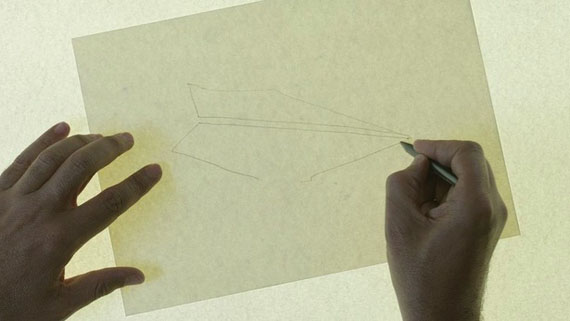
Akram Zaatari »
Letter to a Refusing Pilot
Exhibition: 1 Jun – 24 Nov 2013
Wed 29 May 14:30
Venice Biennale - LEBANON
Calle della Tana 2169/f - Arsenale
30100 Venezia
+39-41-
Akram Zaatari will be presenting a major new work, titled Letter to a Refusing Pilot, in the Lebanese Pavilion at the 55th International Art Exhibition – La Biennale di Venezia. Curated by Sam Bardaouil and Till Fellrath, the exhibition marks the debut of Zaatari’s most aesthetically ambitious and politically nuanced project to date, and creates a dialogue between two works, a new 45-minute video and a looping 16mm film, in an immersive environment conceived as a stage awaiting an actor, or a cinema awaiting a spectator.
In the summer of 1982, a rumor made the rounds of a small city in South Lebanon, which was under Israeli occupation at the time. It was said that a fighter pilot in the Israeli air force had been ordered to bomb a target on the outskirts of Saida, but knowing the building was a school, he refused to destroy it. Instead of carrying out his commanders’ orders, the pilot veered off course and dropped his bombs in the sea. It was said that he knew the school because he had been a student there, because his family had lived in the city for generations, because he was born into Saida’s Jewish community before it disappeared. As a boy, Akram Zaatari grew up hearing ever more elaborate versions of this story, as his father had been the director of the school for twenty years. Decades later, Zaatari discovered it wasn’t a rumor. The pilot was real.
Pulling together all of the different strands of Zaatari’s practice for the first time in a single work, Letter to a Refusing Pilot reflects on the complexities, ambiguities, and consequences of refusal as a decisive and generative act. Taking as its title a nod to Albert Camus’ four-part epistolary essay “Letters to a German Friend,” the work not only extends Zaatari’s interest in excavated narratives and the circulation of images in times of war, it also raises crucial questions about national representation and perpetual crisis by reviving Camus’s plea: “I should like to be able to love my country and still love justice.”
Akram Zaatari
Akram Zaatari is an artist whose work is tied to collecting and exploring photographic practices in the making of social codes and aesthetic forms. Regarding the present through a wealth of photographic records from the past, Zaatari co-founded the Beirut-based Arab Image Foundation in 1997, and he has been working on the extensive archive of Hashem el Madani’s Studio Shehrazade, in the Lebanese port city of Saida, since 1999. The author of more than 40 films and videos—including The End of Time (2013), Tomorrow Everything Will Be Alright (2010), Nature Morte (2008), In This House (2005), This Day (2003) and All Is Well on the Border (1997).
Zaatari investigates notions of desire, pursuit, resistance, memory, surveillance, the shifting nature of political borders and the production and circulation of images in times of war. His works have been featured in dOCUMENTA (13) (2012), the Istanbul Biennial (2011), and the Venice Biennale (2007), among others, and he has shown his films, videos, photographs and other documents in institutions such as the Centre Pompidou in Paris, Tate Modern in London, Kunstverein and Haus der Kunst in Munich, Le Magasin in Grenoble, MUSAC in Leon, MUAC in Mexico City and Videobrasil in Sao Paulo.�